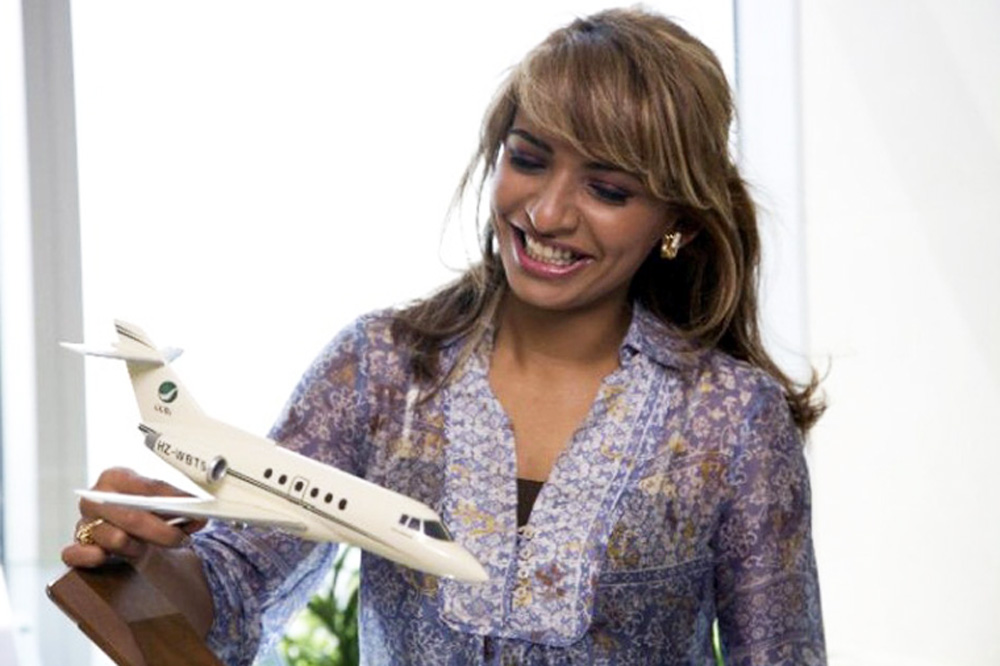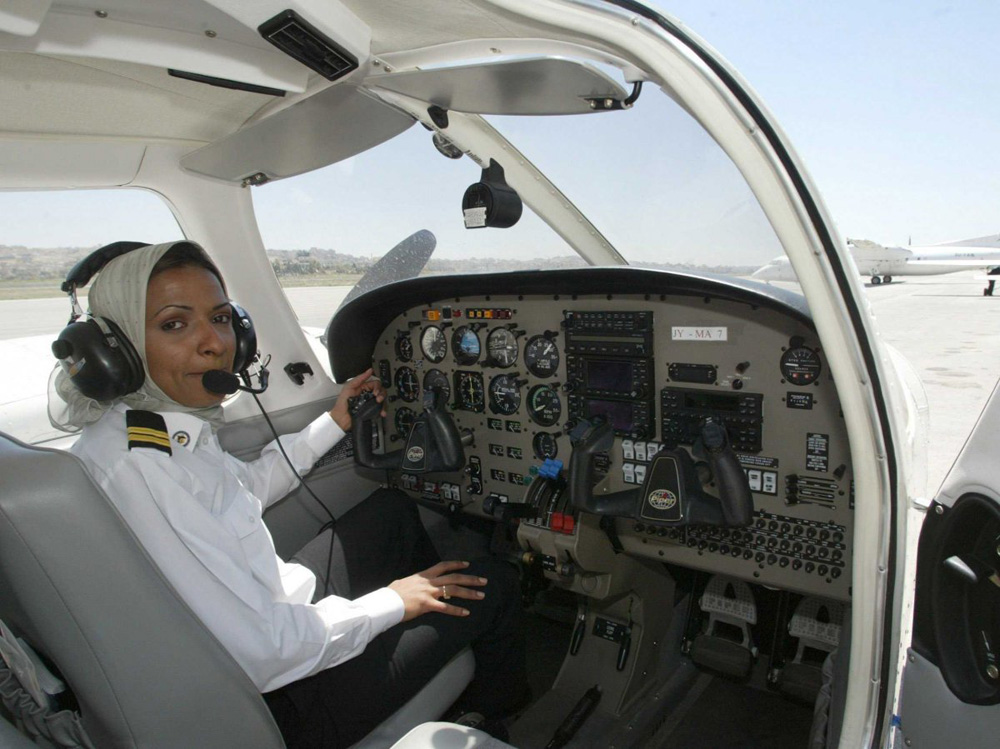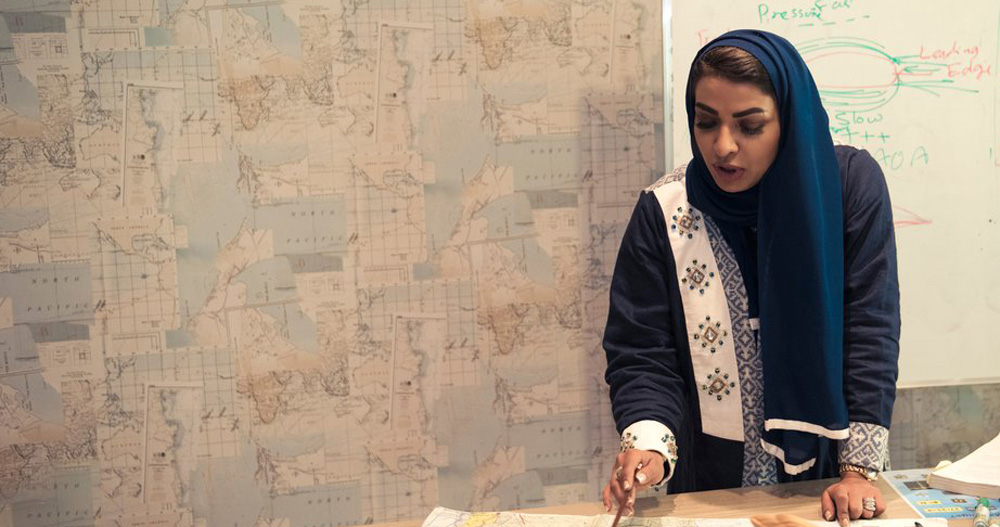
Hanadi Al Hindi
Smashing the glass ceiling for women in Saudi Arabia, Al Hindi was inspired by her late father, Zakaria, who lived his dreams through his daughter and supported her in her career.
Being an Arab female pilot wasn’t always easy for her, but with the support of Prince Al Waleed bin Talal, who had supported Hanadi in her path to becoming a pilot, “What I faced when I flew back in 2012 with Al-Waleed, American women had undergone in the ‘70s. ATC (air traffic control) used to dismiss my calls for landing, just because I am a woman. But the prince told me to keep persevering and to keep on calling until I was heard, and then they did; they even started calling me Captain Hanadi, and whenever I was landing the prince’s private plane they’d secure my landing before any other plane,” she explained to Arab News.

“I don’t want to be a teacher or a doctor — I want something extraordinary, something only men can do in this country; I want to challenge men.” After explaining her ambitions to be a pilot to her father whilst in high school, she began her journey in 2002, spending 16 years dedicated to aviation. Majoring in English at university, Hanadi Al Hindi wanted to be fluently flawless in speaking English as she had seen men and women do on television, and doing exactly that, she had already achieved one of her life goals.
Al Hindi took up her pilot’s training in Jordan, which wasn’t easy for her parents, as she explains how determined she was to succeed, “My mother used to collapse every time I left for Jordan, and an ambulance would have to take her to the hospital — she took my departure the hardest. My family gave up so much for my success, and that is why I cannot ever abandon aviation. They did the impossible for me, and I won’t let them down. My duty (to them) was to succeed,” she said.
Hanadi owes all of her success to her parents and explained how they did everything possible to make her flying dreams come true, not making it about being the first Saudi woman pilot, but only having the ambition to make her father’s dreams for her a reality too, “At the time, my dad faced more obstacles than I did, having a daughter bold enough to pursue aviation in the early 2000s. He worked at a courthouse for the Ministry of Justice — director of the Office of the President of the General Court in Makkah — so you can imagine how much backlash he went through.” When her father encouraged her to pursue piloting in Jordan in 2002, when he retired, many people had a negative reaction and urged him to ask for Hanadi to be bought back to Saudi Arabia, especially when the national media broadcasted her story. Al Hindi explained what her father’s reaction to society who disagreed with her studying abroad was, “If you spent a penny on her education, bring her back, but since I’m the one who’s paying for her education then it is settled. He was told to not have me write his name on any outlets, to act as if he wasn’t my dad, but when I asked him if he wanted me to exclude his name from any documentation, he told me: I forbid it. I want everyone to know that you are my daughter.”

Gaining popularity in the media in 2003, Hanadi Al Hindi’s name resurfaced in 2004 when she signed a contract with Prince Al-Waleed bin Talal. In 2005, she graduated from the Middle East Academy Commercial Aviation and took a slight nosedive in her career in 2013. During her down time she worked towards obtaining a commercial pilot’s license in Saudi Arabia. Upon achieving her license in 2015, but it didn’t come easy for her; as she attempted to acquire a Saudi license, post graduation, Hanadi Al Hindi faced rejection in the KSA.
Instead, she travelled to the UK and continued with her aviation studies, where piloting is a tough industry. Al Hindi’s journey was halted for some time as doctors had discovered that she needed immediate surgery for kidney stones if she wanted to acquire the class 1 medical required to fly. Due to unfortunate events, the surgery she underwent resulted in complications, which kept her out of flying for 2 years. In 2009, doctors had told her that she may never be able to fly since her kidney condition was found to be critical. A year later, Hanadi had to have her kidney removed. Following her surgery, Al Hindi received a call from a Saudi captain, congratulating her on obtaining a first-class medical pass. She discovered that many captains who were born with a single kidney were certified and that she should recover and apply for the medical certificate. She applied for both the American and Saudi’s General Authority of Civil Aviation (GACA) class 1 medical at the same time, as they both required similar documents. The American certificate wasn’t issued immediately, but GACA issued the first class 1 medical certificate to her in 2011.

Against all odds, Hanadi Al Hindi went to America to complete her stay at the Federal Aviation Administration (FAA), and returned to Saudi Arabia in 2013, officially applying for a commercial license. Given just 3 weeks to prepare for her written exams, she went on to pass successfully. She performed her flight test in Jordan where she was observed by two proctors, flying for two hours rather than the one her male counterparts undertook, but she did not falter. After the flight, the examiner asked her how she thought she did and she recalled that moment, “I told him, I don’t think I’ve ever performed as well as I did today — I think you need to hand me my license right now. And he did.” She was now able to fly Prince Al-Waleed bin Talal.
Now in 2018, she is teaching students studying for the written parts of their aviation exams at the Pilot Training Center (PTC) on Prince Sultan Road in Jeddah. Explaining her current profession, she said, “This makes it easier for a lot of to-be-pilots. They can study the written material here, which helps them immensely so that when they take the test in the US, they do not have to worry about it at all. Besides
that, it is cheaper for them, and they’d be doing it in their environment, studying and preparing then finishing classes in time to have dinner with their families.”
Not being able to fly locally in Saudi Arabia just yet, Hanadi Al Hindi chose to teach people how to fly, starting with the basics instead of not working at all. “The book I teach here is the same one they cover in every airline and school, but I don’t just give it to my students to memorize. I summarize the gist and point out to them what they will use when they practice piloting,” Al Hindi explained, “When I teach my students, the stakes I place on them are high — I tell them ‘your grade is my grade’ and that their effort reflects my work and what I’ve poured into them. When asked about who taught them, it will be my name they utter, and I want them to always remember me well.”

















